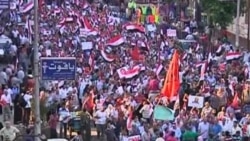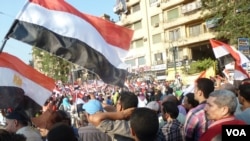Egypt's military and supporters of ousted President Mohamed Morsi are waging a war of words, blaming each other for a clash that killed at least 51 people and injured hundreds of others.
Witnesses said the streets near the Republican Guard headquarters filled with tear gas and shots rang out as Morsi supporters staged a protest early Monday. Muslim Brotherhood officials charged the army opened fire without provocation. Military officials accused terrorist groups of trying to storm the building.
Interim Egyptian President Adly Mansour called for restraint and ordered a judicial investigation, but the incident has further frayed efforts to form a transitional government. The ultra-conservative Salafi Nour Party says it is withdrawing from talks to form a new government, citing what it called a massacre.
Pro-reform leader and former Nobel Peace Prize winner Mohamed ElBaradei took to Twitter to condemn the violence, but also said "peaceful transition is the only way."
The Muslim Brotherhood called for an "uprising" against what it says are those "who want to steal the revolution with tanks."
After the incident. VOA's Sharon Behn visited one of the field hospitals run by the Muslim Brotherhood in Cairo's Nasr City.
"The scene here is quite chaotic. They say that many wounded have been brought in here and that they were shot by the Egyptian military while they were at there prayers," said Behn. "We have seen people with bullet wounds to the head and one with a pretty severe bullet wound to his side. He said they were shot while they were at prayers and that he saw one three-month-old actually get killed right in front of him."
Erupting violence
Mohamed Amer was one of the injured brought to that hospital and he spoke to VOA.
“We were praying in the square in front of the Republican Guards, we start praying at 2:15 a.m. until dawn, while we were kneeling we heard our security people calling for help," said Amer. "The imam finished the prayer quickly and then we heard the loud sound of tear gas cannisters, and the sound of bullets. We found the bullet shells later, and two live rounds, and they attacked us from the right and the left.”
Military officials continue to argue that Morsi-supporters ignited the violence, releasing video to state-run TV which claims to show protesters throwing rocks before one man steps forward and appears to fire a gun.
Mohamad Ibraheem said he was one of the soldiers injured during the fighting.
"We were there to ensure the safety of the people. When we were there, they started firing at us and throwing Molotov cocktails and bricks," said Ibraheem. "Many of my colleagues were hit by the fire, and the proof is here at the hospital. I was standing in the middle trying to calm things down and someone came and stabbed me with a piece of metal in my waist, after that I did not feel a thing.''
Establishing new government
Egypt's interim leaders have been struggling to put together a new government acceptable to both backers and opponents of Morsi.
The political standoff between the secular and liberal-dominated transitional government and hardline Islamist lawmakers intensified on Saturday, after interim President Adly Mansour's office - under pressure from Islamists - backtracked on a decision to appoint Mohamed ElBaradei as Egypt’s interim prime minister.
The transitional prime minister will have sweeping powers to govern, while the president is expected to be a largely symbolic post.
In Washington, President Barack Obama voiced renewed concern about the political upheaval, while reiterating the United States is not aligned with and does not support any particular Egyptian political party or group.
The army described Morsi's removal as necessary to enforce the will of millions of people who have repeatedly demanded his resignation.
Witnesses said the streets near the Republican Guard headquarters filled with tear gas and shots rang out as Morsi supporters staged a protest early Monday. Muslim Brotherhood officials charged the army opened fire without provocation. Military officials accused terrorist groups of trying to storm the building.
Interim Egyptian President Adly Mansour called for restraint and ordered a judicial investigation, but the incident has further frayed efforts to form a transitional government. The ultra-conservative Salafi Nour Party says it is withdrawing from talks to form a new government, citing what it called a massacre.
Pro-reform leader and former Nobel Peace Prize winner Mohamed ElBaradei took to Twitter to condemn the violence, but also said "peaceful transition is the only way."
The Muslim Brotherhood called for an "uprising" against what it says are those "who want to steal the revolution with tanks."
After the incident. VOA's Sharon Behn visited one of the field hospitals run by the Muslim Brotherhood in Cairo's Nasr City.
"The scene here is quite chaotic. They say that many wounded have been brought in here and that they were shot by the Egyptian military while they were at there prayers," said Behn. "We have seen people with bullet wounds to the head and one with a pretty severe bullet wound to his side. He said they were shot while they were at prayers and that he saw one three-month-old actually get killed right in front of him."
Erupting violence
Mohamed Amer was one of the injured brought to that hospital and he spoke to VOA.
“We were praying in the square in front of the Republican Guards, we start praying at 2:15 a.m. until dawn, while we were kneeling we heard our security people calling for help," said Amer. "The imam finished the prayer quickly and then we heard the loud sound of tear gas cannisters, and the sound of bullets. We found the bullet shells later, and two live rounds, and they attacked us from the right and the left.”
Military officials continue to argue that Morsi-supporters ignited the violence, releasing video to state-run TV which claims to show protesters throwing rocks before one man steps forward and appears to fire a gun.
Mohamad Ibraheem said he was one of the soldiers injured during the fighting.
"We were there to ensure the safety of the people. When we were there, they started firing at us and throwing Molotov cocktails and bricks," said Ibraheem. "Many of my colleagues were hit by the fire, and the proof is here at the hospital. I was standing in the middle trying to calm things down and someone came and stabbed me with a piece of metal in my waist, after that I did not feel a thing.''
Establishing new government
Egypt's interim leaders have been struggling to put together a new government acceptable to both backers and opponents of Morsi.
The political standoff between the secular and liberal-dominated transitional government and hardline Islamist lawmakers intensified on Saturday, after interim President Adly Mansour's office - under pressure from Islamists - backtracked on a decision to appoint Mohamed ElBaradei as Egypt’s interim prime minister.
The transitional prime minister will have sweeping powers to govern, while the president is expected to be a largely symbolic post.
In Washington, President Barack Obama voiced renewed concern about the political upheaval, while reiterating the United States is not aligned with and does not support any particular Egyptian political party or group.
The army described Morsi's removal as necessary to enforce the will of millions of people who have repeatedly demanded his resignation.








